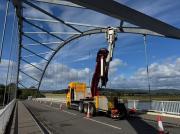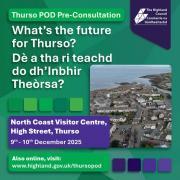17 Highland datazones in most deprived 15% in Scotland
18th December 2012
The Highlands has 17 datazones ranked in the most deprived 15% in Scotland according to the Scottish Government’s latest release of the Scottish Index of Multiple Deprivation (SIMD).
SIMD has been designed to identify the most deprived areas across Scotland. It uses statistical information across a range of topics which are combined to indicate deprivation at household level.
The SIMD measures deprivation at small area level called datazones. These are areas which have a standard population of between roughly 500 and 1000 people and cover a wide range of geographical areas. There are 6,505 datazones in Scotland and 292 in Highland.
It is common practice to look at the 15% most deprived datazones within Scotland. Within the 2012 release, Highland has 17 datazones in the most deprived 15% in Scotland, an increase of one from the previous version on the index from 2009 this means that 5.8% of Highland datazones are classed as multiply deprived. Deprivation continues to be concentrated in areas identified in earlier releases, but one datazone in Dingwall is now classed as deprived. Datazones falling within the 15% most deprived in Scotland on order of rank are-
Inverness Merkinch North; Inverness South Kessock; Wick Pultneytown South; Inverness Merkinch East; Invergordon Strath Avenue; Wick Hillhead North; Inverness Central and Longman; Inverness Merkinch South; Wick South; Alness Kirkside; Inverness Hilton West; Seaboard South; Inverness Merkinch Telford; Dingwall Central; Wick South Head; Inverness Raigmore North; and Alness Teaninich.
Council Leader Drew Hendry said “Clearly deprivation is an ongoing concern and we are determined to do what we can, locally, to tackle this. Although levels of poverty are relatively low in Highland compared to some other areas of Scotland, the SIMD is very useful in helping us to identify multiply deprived communities. We know too t that this is only part of the picture, so our services and the new preventative funding from the Council will also reach children, unemployed people and older people living in our rural communities where deprivation can be more hidden and not shown by SIMD. We will step up our work with others, such as the police and NHS Highland through the new partnership arrangements to take a co-ordinated approach to this serious issue.”
It is important to note that the deprivation of each datazone is relative to all others and not absolute. Also, the SIMD was designed to measure concentrations of deprivation. It is good at achieving this. However, it doesn’t identify rural deprivation where deprivation is spatially dispersed with the very rich living alongside those who are very poor.
Scottish Index of Multiple Deprivation 2012
18/12/2012
Scotland's Chief Statistician today published the Scottish Index of Multiple Deprivation (SIMD) 2012. The SIMD is the Scottish Government's official tool for identifying those places in Scotland suffering from multiple deprivation. It has been an important policy tool for many years, providing evidence to help target policies and resources at those places with the greatest need.
SIMD 2012 measures seven different aspects of deprivation - Employment, Income, Health, Education, Access to Services, Crime and Housing. These different 'domains' are combined to produce a single index which provides a relative ranking for each small area in Scotland from 1 (most deprived) to 6,505 (least deprived).
A new web portal has been developed to provide users with a single point of access to the SIMD 2012 publication and other helpful resources including links to interactive mapping to visualise the results of the SIMD 2012, tailored summaries of SIMD 2012 findings for Local Authorities, access to the data used to construct the index, and relevant guidance papers to understand how to use the SIMD. A short podcast is also available providing a brief introduction to the SIMD, how it is constructed, and how to use the new SIMD 2012 web portal.
Key findings from SIMD 2012 include:
* The SIMD 2012 shows that relative multiple deprivation in Scotland has become less concentrated over time. In SIMD 2004, nearly half of all datazones in the most deprived 10% across Scotland were in Glasgow City. In SIMD 2012 this has dropped to just over one third, with corresponding rises in other Local Authorities. Note that this does not provide any information on overall absolute levels of deprivation; the Index is based only upon relative rankings, and it is not possible to compare absolute levels of multiple deprivation from one index to the next.
* Glasgow City, Edinburgh City, West Lothian, Aberdeen City and South Lanarkshire have seen relatively large decreases in their share of datazones in the 15% most deprived areas in Scotland between SIMD 2009 and SIMD 2012.
* North Lanarkshire, Fife, Renfrewshire and East Ayrshire have seen relatively large increases in their share of datazones in the 15% most deprived areas in Scotland between SIMD 2009 and SIMD 2012.
* Eilean Siar, Moray, Orkney Islands and Shetland Islands do not have any datazones in the 15% most deprived in the SIMD 2012. This does not mean that there is no deprivation in these areas; rather that it is not concentrated in small areas.
The full statistical publication can be accessed at http://simd.scotland.gov.uk/publication-2012/
Highland information on deprivation at -
http://www.highland.gov.uk/yourcouncil/highlandfactsandfigures/deprivationandfragility/default.htm
Related Businesses
Related Articles
Exciting Career Opportunities With The Highland Council Now Open For Applications
# 10 December 2025 Career opportunities with The Highland Council The Highland Council is looking to fill a variety of posts relating to civil engineering and flood risk management based in locations across the area. Included are opportunities specifically for civil engineering graduates and technicians, providing the ideal job with career progression for anyone recently qualified and ready for a varied and interesting role.
What the NC500 Research Projects Are Designed to Do - and Why They Matter for the Highlands
As the North Coast 500 approaches its tenth anniversary, it has become one of Scotland's most well-known tourism success stories. The 516-mile loop around the far north of the Highlands has been celebrated internationally, marketed as a world-class road trip, and credited with transforming visitor numbers in some of Scotland’s most remote areas.Help Shape the Future of Thurso
The Highland Council is inviting people that live, work, or study in Thurso, to come along to the public consultation events to have their say. This is an opportunity to help shape the future of Thurso, to gather views and ideas.
Are Scottish Councils Quietly Reversing Outsourcing? A Look at Insourcing, Cuts and the Highland IT Shift
A notable article in the Guardian on 6 December 2025 noted the high sums being paid by London councils outsourcing services to private firms. The article starts with the reduction in council funding by UK government since 2010.Council welcomes Visitor Levy flexibility plan
The Highland Council welcomes moves by the Scottish Government to introduce greater flexibility on how it could design a Visitor Levy Scheme for consultation. The Visitor Levy (Scotland) Act 2024 currently provides local authorities with discretionary powers to implement percentage-based levies following statutory consultation.Highland Council is reaching out for views to shape its next 26/27 budget.
As it looks to set out its forthcoming priorities, the council is seeking involvement from members of the public, including businesses, community groups, parents, and young people. All their opinions are going to be crucial in deciding how Highland Council will take on its budget challenge for 2026-2027.Have your say in Thurso's future £100million investment by attending public consultation events
Thurso is to benefit from £100m investment in education and community facilities and are rolling out the first phase of public consultations on 9 and 10 December 2025. The Highland Council is inviting people that live, work, or study in Thurso, to come along to the public consultation events to have their say; this is an opportunity to help shape the future of Thurso, to gather views and ideas.Finding new owners for empty homes - Scheme launched to help return more empty homes to active use
A new online portal has been launched to bring empty homeowners together with prospective buyers or developers with the aim of facilitating more properties to be used as homes again. Covering the whole of Scotland, this builds on the success of local pilots, referred to as "matchmaker schemes".Consideration for short term let control area in Skye and Raasay
Steps towards introducing a short term let control area have been considered by Highland Council's Isle of Skye and Raasay area committee. On Monday (1 December 2025) the committee heard evidence to justify the grounds for the introduction of a Short Term Let Control Area covering all or part of Skye and Raasay.Workforce North event spotlights Highland economy
EMPLOYERS and educators from across the Highlands have gathered to hear how a new initiative is aiming to transform the region's economy. Workforce North - A Call to Action brought together business leaders and teachers from primary and secondary schools from across the Highland Council area with a wide range of partners geared towards education, learning and skills development at Strathpeffer Pavillion.
